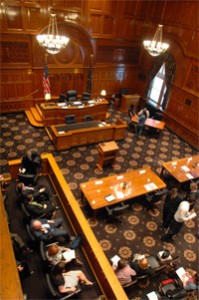Let the (Oral) Argument Begin
 Kudos (on getting this far) and best wishes (as we move forward) to the sixteen upper-level students who are competing this week in the quarterfinals of the Jenkins Moot Court Competition. The students earned this right based on their top performance in last fall’s Appellate Writing and Advocacy course, which is a prerequisite or gateway to both the intramural Jenkins Competition and all extramural or interscholastic moot-court competitions. The students are paired into eight teams of two for purposes of the Jenkins Competition:
Kudos (on getting this far) and best wishes (as we move forward) to the sixteen upper-level students who are competing this week in the quarterfinals of the Jenkins Moot Court Competition. The students earned this right based on their top performance in last fall’s Appellate Writing and Advocacy course, which is a prerequisite or gateway to both the intramural Jenkins Competition and all extramural or interscholastic moot-court competitions. The students are paired into eight teams of two for purposes of the Jenkins Competition:
- Lindsay Caldwell & Lindsey Johnson
- Alyssa Dowse & Tim Sheehey
- Jessica Farley & Brent Simerson
- Sandy Giernoth & Megann Senfleben
- Tim Hassel & Joe Brydges
- Rachel Helmers & Nick Harken
- Amber Peterson & Allison Ziegler
- Nicole Standback & Bridget Mueller
Each team writes a brief in the first half of the spring semester and has a chance to argue twice in a round of quarterfinals. Thereupon, based on a weighted scoring of the brief and the oral arguments, four teams advance to the semifinals. The briefs having been “filed” several weeks ago, the oral arguments begin this week, and culminate in the Jenkins Finals at the United States Courthouse at 6 p.m. on Thursday, April 2.
More information on the reasons the Law School structures its moot-court competition this way can be found in this article from the Marquette Lawyer or at the moot-court webpage (and a student’s perspective can be found in a very fine post by a guest blogger last month, Jessica Franklin). I hope that all will join me in congratulating and wishing well to this year’s Jenkins competitors.

